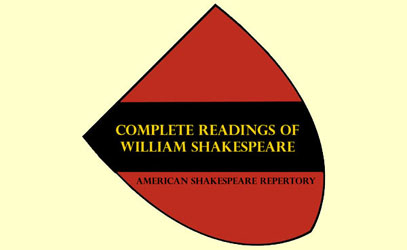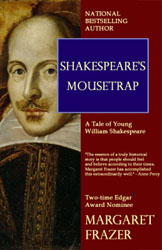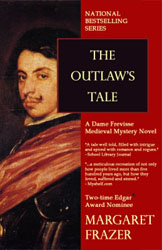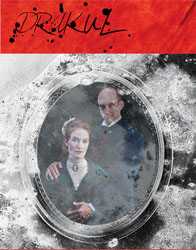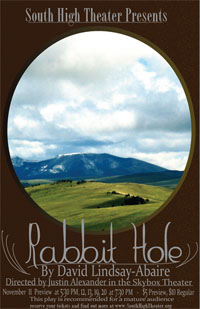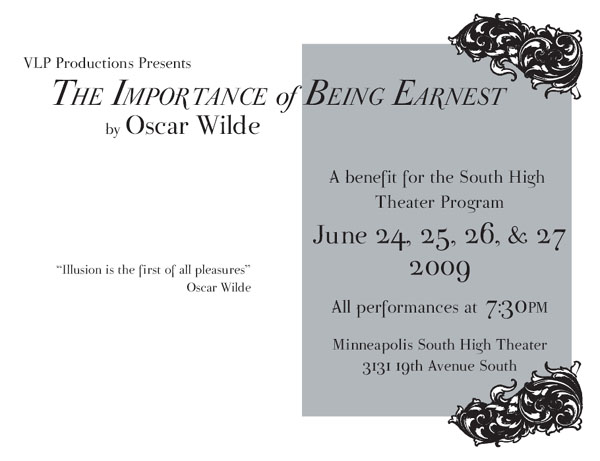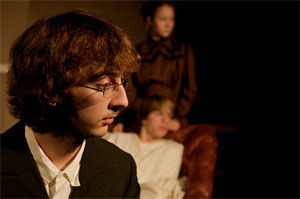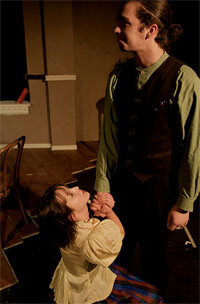
Photo by Mark Vancleave
Back in 2009 I posted a series of essays on my work translating The Seagull by Anton Chekhov. This essay was written, but apparently I forgot to actually post it to the website. Whoops.
In Act III of The Seagull, Trigorin threatens to leave Arkadina for Nina. Arkadina, driven to desperation, succeeds in seducing Trigorin and convinces him to stay with her. (“He’s mine now,” she says to herself. And she’s right.) Trigorin then opens the small notebook that he keeps in his pocket and jots something down.
Аркадина. Как хочешь. Вместе, так вместе…
Пауза.
Тригорин записывает в книжку.
Что ты?
Тригорин. Утром слышал хорошее выражение: «Девичий бор»… Пригодится. (Потягивается.) Значит, ехать? Опять вагоны, станции, буфеты, отбивные котлеты, разговоры…
Which can be literally translated as:
Arkadina: As you wish. However, both together …
Pause.
Trigorin writes in the book.
What?
Trigorin: This morning heard the expression: “Virgin forest” … Handy. (Stretches.) So, go? Again, cars, stations, buffets, chops, talking …
The key phrase here is “Девичий бор” — “virgin forest”. It’s pretty easy to look at the juxtaposition of “I heard an expression” and “virgin forest” and leap straight to the common English phrase: “virgin wood”. And, indeed, a casual survey of translations of The Seagull reveals that virtually everyone goes for the easy solution.
But there is a problem here: Trigorin jots it down as something worth remembering; an oddity that must be recorded. Generations of English-speaking actors and their audiences have struggled with making sense out of Trigorin’s seeming unfamiliarity with a common phrase.
A quick search of Russian sources, on the other hand, reveals what I suspected: Unlike “virgin wood”, the phrase “Девичий бор” is virtually unknown outside of The Seagull. So one can immediately intuit that there is an important context for “Девичий бор” which is being lost when we translate it simply as “virgin wood”.
My next step was to pull open a Russian-to-English dictionary.
Девичий — maiden (girl’s, maidenly, virgin, maidenish, maiden-like)
бор — boron, chemical element; forest, thicket
I think we can safely discard the “boron” definition. But this may suggest that we should be wary of putting too much weight into the word “virgin” here. “Maiden” has a very different connotation to it.
Poking around the Russian Google for awhile, I dig into a few of the obscure non-Chekhovian uses of the phrase. One is a 1939 book called Montenegrin’s Tales (Черногорские сказки), which appears to be a collection of folklore by P. Stiyensky (Стийенский Р.). One of the stories has this phrase as the title, but I’ve been unable to find out any details about it.
Another reads: “Их было четверо, девичий бор, кружок, тайное общество, можно сказать. Учились в одной школе.” In English: “There were four in theдевичий бор; a circle, a secret society you might say. They studied together at school.” And the phrase is used again in the same work, once again to describe this small group of girls.
This is intriguing to me because it suggests that the use of the word “forest” or “grove” or “thicket” might be the metaphor in this phrase (rather than “maiden” or “virgin”). In other words, it is not the wood which is being described as virginal, but rather the maidens who are being described as like a forest — like a thicket of trees grouped together.
And, looking at the context of the scene, it begins to make sense why Trigorin would suddenly be struck by such a phrase: He has been beset in rapid succession by Nina and then Arkadina. He feels pulled this way and that by the women around him. They are a thicket penning him in.
I have now defined the parameters of the problem: I need a catchy turn of phrase which is (a) original rather than proverbial and (b) invokes the imagery of a covey of women.
What I eventually came up with was “girlish gaggle”. I was unhappy to lose the sense of “forest” or “trees” from the phrase, but I think it nevertheless strikes closer to home than “virgin wood”.
(EDIT: Intriguingly, a reference that has cropped up on Russian Google since I originally translated the script seems to suggest that Девичий бор might be a “paraphrasing” (typo?) of девичий вор — which can be translated as “maiden’s burr” or “girl thief”. I wish I had a better understanding of Russian to fully appreciate the argument being made, but if I accept it at face value then it raises the interesting possibility that I had it backwards: Is Trigorin actually referring to himself as a burr which catches upon women? There is invocation of both injury and clinging which I find intriguing.)

